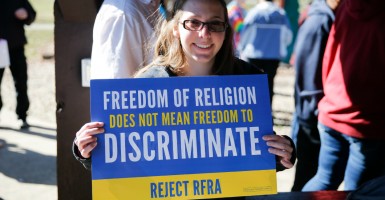Despite the frenzied protests of critics, Indiana’s recent Religious Freedom Restoration Act is not the imposition of Jim Crow and is not going to lead to a kind of Selma for the gay rights movement.
Indiana has simply passed a law that enshrines the First Amendment values that we hold dear and have taken for granted for more than two centuries.
The double standard evident in the condemnation of Indiana’s Religious Freedom Restoration Act is undeniable. Indiana’s law is almost identical to the federal Religious Freedom Restoration Act of 1993, which was passed unanimously by the House of Representatives and overwhelmingly in the Senate by a 97 to 3 vote. In its congressional findings, Congress recognized the “free exercise of religion as an unalienable right” guaranteed by the First Amendment.
The federal Religious Freedom Restoration Act was signed into law by then-President Bill Clinton, although his wife now conveniently condemns the Indiana version. Sen. Chuck Schumer, D-N.Y., who was one of the chief sponsors of the federal Act, is criticizing the Indiana law and denying they are the same. But Schumer’s claim that the comparison is “completely false” is itself “completely false.”
The Difference Between the Federal Law and Indiana’s Law
The federal Religious Freedom Restoration Act (42 U.S.C. §2000bb-1) says that the “Government shall not substantially burden a person’s exercise of religion” unless it “demonstrates that application of the burden to the person –
(1) is in furtherance of a compelling governmental interest; and
(2) is the least restrictive means of furthering that compelling governmental interest.”
A person can assert this provision as a “claim or defense in a judicial proceeding and obtain appropriate relief against a government.”
The new Indiana law (Sen. Bill No. 568) says that “a governmental entity may not substantially burden a person’s exercise of religion, even if the burden results from a rule of general applicability” unless it “demonstrates that application of the burden to the person” is:
- in furtherance of a compelling governmental interest; and
- the least restrictive means of furthering the compelling governmental interest.
A person can assert this provision “as a claim or defense in a judicial or administrative proceeding, regardless of whether the state or any other governmental entity is a party to the proceeding.”
These two provisions are virtually identical.
The Federal Law Also Protected Companies, Not Just Individuals
Schumer now claims that the federal Religious Freedom Restoration Act was intended to protect only individuals and he criticizes the Indiana law for protecting private companies and corporations. It is true that the word “person” is defined in the Indiana law to include “an individual, an association, a partnership, a limited liability company, a corporation, a church, a religious institution, an estate, a trust, a foundation, or any other legal entity.”
But the federal Religious Freedom Restoration Act also uses the word “person” although it doesn’t define the term as the Indiana law does. But then it doesn’t need to. Under 1 U.S.C. §1, also known as the federal Dictionary Act, the word “person” when used in an “Act of Congress” includes “corporations, companies, associations, firms, partnership, societies and joint stock companies, as well as individuals.” It has been this way since the first dictionary act back in 1947.
So Schumer’s claim about the federal law only covering individuals is “completely false.” He knew what he voted for back in 1993.
It seems pretty obvious after the Supreme Court’s recent decision in Burwell v. Hobby Lobby, over the abortion/contraception mandate of Obamacare, that the federal Religious Freedom Restoration Act doesn’t just protect the religious freedom rights of individuals. It also applies to family-owned companies. As the Supreme Court made clear, “Congress enacted RFRA [Religious Freedom Restoration Act] in 1993 in order to provide very broad protection for religious liberty.”
Why State Versions of the Religious Freedom Restoration Act Exist
It is also important to note that the federal law was intended by Congress (and Schumer) to apply to both the federal government and the states. The bill said that the term “government” included both the federal government and the states.
The reason that 19 states passed state versions of Religious Freedom Restoration Act, with Indiana being the 20th state, is because the Supreme Court ruled in 1997 in City of Boerne v. Flores that while Congress could apply Religious Freedom Restoration Act’s protections to the federal government, it did not have the authority to extend Religious Freedom Restoration Act to state governments. Eleven other states have also interpreted their state constitutions to extend Religious Freedom Restoration Act—type protections.
Some have tried to claim that the Indiana law is different because it specifically allows its protections to be asserted as a defense in a lawsuit to which the government is not a party, but a number of federal courts of appeal, including the Second, Eighth, Ninth, and D.C. Circuits have all held that the federal Religious Freedom Restoration Act can be asserted in a private action. The Sixth and Seventh Circuits have held the opposite, leading to a split in the circuits. So Indiana was simply making specific in its statute the rule already implemented by at least four federal appeals courts.
The bottom line is that there is almost no substantive difference between the Indiana law that is being unfairly condemned and the federal law passed with almost universal approval. Both of these laws simply cement in place the protections of the Religion clauses of the First Amendment.
The Left’s Double Standard on Religious Freedom Laws
The double standards implicit in the criticism of Indiana is aptly demonstrated by Connecticut Gov. Dan Malloy, a Democrat, who announced he was barring state travel to Indiana. He may want to bar state travel to Connecticut, too, given that his state has a Religious Freedom Restoration Act law that has a less strict legal standard than Indiana’s law. While Indiana and the federal Religious Freedom Restoration Act bar the government imposing a “substantial” burden on religious exercise, the Connecticut law (Section 52-571b) leaves out the “substantial” requirement and simply bars any “burden” imposed on religious exercise.
Has Connecticut been a hotbed of “discriminatory” activity since it passed its Religious Freedom Restoration Act in 1993? Highly doubtful. Will Indiana become a hotbed of such discrimination? Also highly doubtful.
Traditionally religious Hoosiers and gay Hoosiers can patronize the same establishments, or different establishments, and life will continue as before. No, restaurants and bars will not be able to refuse service to gays because of this law.
Yes, bakers, florists, photographers and others who try to live their lives according to their religious beliefs will be able to rely upon the state Religious Freedom Restoration Act as a defense in any lawsuit brought by the government (or someone acting based on some government authority) to force them to participate against their will in a private same-sex marriage ceremony when doing so would violate their sincerely-held religious beliefs, at which point it would be the burden of the government (or private actor) to prove that it is seeking to vindicate a compelling interest that cannot be achieved in a less restrictive way.
But then, that has long been an accepted belief (and a protected right) in America—that is why the Supreme Court ruled in 1943 in West Virginia State Board of Education v. Barnette that school children could not be forced to recite the Pledge of Allegiance when it violated their religious beliefs.
Critics of Indiana’s Religious Freedom Restoration Act, including born-again critics who once supported the federal Religious Freedom Restoration Act or Religious Freedom Restoration Acts in their own states, apparently don’t (or no longer) believe in the importance of religious liberty. They seem to have nothing but angry contempt for religious adherents of all stripes who seek to live in accordance with their fundamental beliefs and who won’t conform to their progressive vision of how all Americans should behave.
This article has been modified.

























